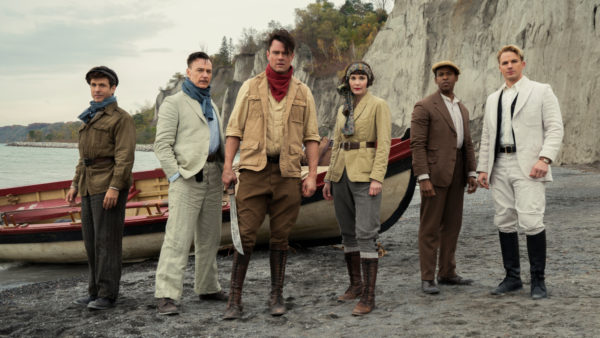
The time has come to tackle all eight episodes of Jupiter’s Legacy and discuss what went wrong.
Spoilers follow for all 8 season one episodes
Miss the review of episodes 1-4? Read it here.
JOE
Well Linds, after watching the entirety of S1 of Jupiter’s Legacy, I can’t say that I know much more about Mark Millar’s world than when we first began.
It’s hard to describe the crushing sense of dismay as the series heads into its final episodes and it becomes increasingly clear that there not only isn’t going to be any clarity, but also that the series effectively delivered an eight episode prologue. It’s the equivalent of “Thanks for watching. Stay tuned for the good stuff in S2…hopefully!”
Sadly, what this first season has proven is that there’s not enough meat on these bones to justify giving the series any more time. Jupiter’s Legacy isn’t lacking a compelling hook or (reasonably) competent actors, but the resistance to actually telling a compelling story or giving its competent actors something (anything!) to do is near unforgivable.
Let’s tackle what I perceive to be the series’ single greatest weakness: the cross-cutting between the past and the past.
I lamented in our first review that narrative beats of the past and the present rarely speak to each and that trend continues all of the way through to the finale. Sure, these narratives tend to focus on the same character (say, Leslie Bibb’s Grace/Lady Liberty in episode six), but unlike nearly every other series that uses this storytelling device, there’s virtually no other connections between the timelines.
This is especially aggravating as the series progresses because the flashbacks become increasingly redundant: Sheldon (Josh Duhamel)’s struggle to find and unite the six individuals, rope them into a journey across the ocean and corral them through a series of “tests” on the mysterious living island should be compelling.
Except, of course, we already know that they survive to become the originators of the Union and the arbiters of the Code. This robs the past scenes of any and all sense of drama.
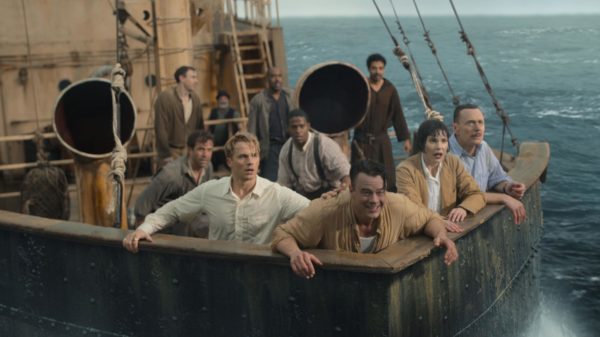
Instead we have some showy FX and a lot of yelling and crying as the motley crew journeys towards their final test to prove their worth, which – naturally – happens in the season finale. How is this exciting to watch when the past offers the audience nothing in the way of new or relevant information? The sad answer is that it isn’t; even though I wound up preferring the old fashioned B-movie vibe of the 1930s-set scenes, they also completely overstay their welcome.
Had the series played out chronologically, so that the first half of the season built to the moment in the alien world when they acquired their powers and then flashed forward to the present to explore how it all went to shit, we might be having a different conversation. As it stands, though, nearly half of the show is kinda pointless.
Alas, that sad sense of “meh” pervades over most of Jupiter’s Legacy. The series delights in wasting time on plot lines that it can’t be bothered to follow through, or even explain why it’s so important. (I seriously spent most of the back half trying to pin down if the Code simply precludes killing. Turns out that, nope, it also includes not taking over the world! The fact that these two rules are the source of so much dissent is honestly laughable).
Ultimately the only real plot line I had any investment in was the lingering mystery of why George (Matt Lanter) broke from the group to become the Union’s arch nemesis. Naturally this is but one of many dangling plot threads that Jupiter’s Legacy fails to elaborate or resolve. Clearly Millar and co. believe that a) they have spent the season world building and laying the foundation for bigger things in future seasons and b) all of these mysteries will generate audience excitement for S2.
I’m pretty confident in saying they’re wrong on both accounts.
But Linds, I’m hogging the mic. What did you think of the season overall? Did the lack of specifics about the politics of superheroing and the Code, as well as the (supposedly) escalating villain threat bother you? Were you, like me, annoyed that each episode introduced at least one new character? And how have you managed to go this long without addressing the atrocious wigs?!
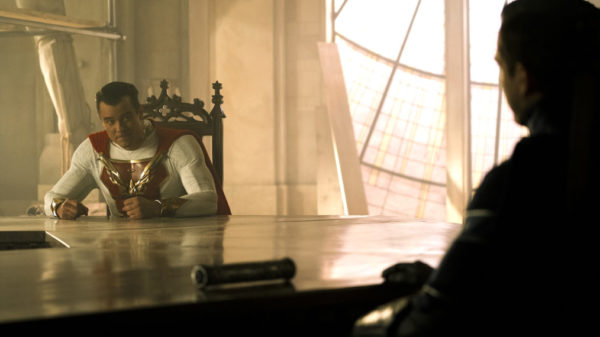
LINDSAY
Whew, can I just say “same”?
In my notes, I started to make a list of themes the show introduced that I’d hoped would be explored or reconciled. Unfortunately, the amount covered was zero. There was no reflection on the Code, no reflection on changing views of capitalism, no reflection on the visibility of “bad guys” or blurry ethical lines in modern times, nothing was ultimately said about policing and vigilantism.
Need I continue?
It’s such a colossal miss, especially when the show had to know it would be compared to cohorts like The Boys and Invincible. When we reviewed the first four episodes, I was worried Jupiter’s Legacy wouldn’t get to everything in time; now I truly can’t believe they didn’t even try.
I’m not so much annoyed as disappointed. I almost feel trolled by the officer’s winks and press conference scenes, as well as Brandon (Andrew Horton)’s entire teased arc (Speaking of Brandon, the show sets up that it’s going to be his story, then grounds him to shirtless farming to make room for a bunch of new characters).
The new characters aren’t just a miss because of how many there were, but how little they mattered. We are introduced to the powered-kids-doing-bad-things gaggle that had the opportunity to be compelling. Where did they get their powers? Why did they choose thievery to saving the world? (Which could have been a fun thing to explore when the heroes are “dying out there” saving the world with the code but…). Who is their mysterious boss and what are they trying to steal? So. Many. Questions.
Alas, they don’t at all matter and are mostly abandoned for a shallow love story that spends more time judging Chloe (Elena Kampouris) for having sex than letting her have fun. There are villains like the glasses-wearing Blackstar (Tyler Mane) and his clone, and the villainous psychiatrist behind bars who is the only one that Sheldon can confide in. HOW SPICY. But, that, too, doesn’t at all amount to anything.
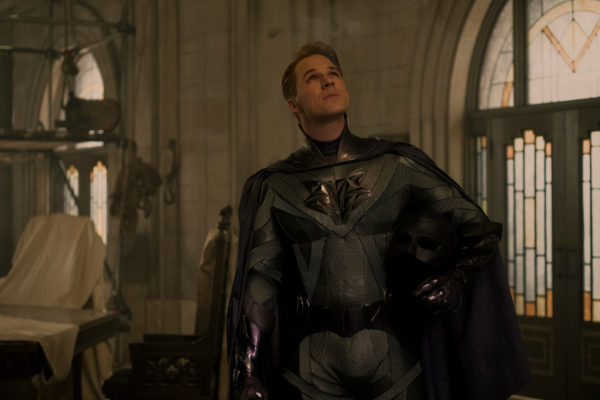
Then there’s George. So much time is spent in the past setting up George. His jealousy, the loss of his money, and his competitiveness with Sheldon’ biological family. Hell, even the jarring height difference between him and Sheldon.
And when he finally shows up in the present, it’s a gambit and an illusion. Not only do all of these characters just not matter at all, none of them are the discernable Big Bad. The conflict of the series is, arguably, the Code and how it might no longer work. But the villain doesn’t present himself until the “twist” in the last episode. Honestly, that’s just not good writing.
Like you said, the whole season feels like a prologue but not only does it not set up anything interesting, it also doesn’t finish the job. How did Sheldon go from engaged to another woman to married to Grace? (Poor Meg Steedle: cast as a disrespected woman in the prohibition era). Where did George go after the boat trip? Who is the mother of Walter’s child? If Sheldon, George, and Walter never really worked their shit out, how did they get their powers? How did the Union get formed and where did the Code come from?
If the show thinks audiences are going to line up for more prologue in season two, I agree with you, Joe, that they’re mistaken.
Now, to tackle the most important topic: the wigs. MY GAWD THE WIGS.
Let’s line up the nominees for Worst Wig in Jupiter’s Legacy (2021):
- Chloe’s Pixie Wig. Many of us know Elena Kampouris with her natural puffy blonde hair. But this isn’t your grandma’s Kampouris; this is a twenty something model who has dark thoughts about her dark life. Hence her black pixie wig. A wig that looks so large for her low profile noggin that I swear we saw her tug on it on screen. A disaster.
- Grace’s Silver Fox. Grace’s straight hair is set in canon by her 1920’s appearance. It’s almost fathomable that she would have such slick and shiny hair after it loses its colour, but it’s ultimately not that believable. The wig might have gotten away with it but for the shower scene where she squeezes those faux strands together to get the water out because the water in question is in NO WAY penetrating that synthetic lace-front.
- Grace’s Black Bob. Leslie Bibb has been a blonde babe almost as long as we’ve seen her on screen. And it’s not that she can’t pull off dark shades…but that Party City flapper wig ain’t it. I almost want to wink at whomever had to cover up that impossible-to-believe-part with a collection of scarves and hats. We weren’t fooled.
- Sheldon’s Aging Grey. Honestly, poor Josh Duhamel. In the flashback scenes, we’re treated to the man’s natural thick head of dark hair. When he embodies the modern day The Utopian, however, he’s given a scraggly mess that should have been left in the wig box. It dangles off of his crown like a literal mop. Not helping matters is how unfamiliar with long hair Duhamel appears; it’s as though he’s baffled by how to move in the wig.
Honestly, it’s hard to pick a winner, but I think I’m going to have to give it to The Utopian. It’s truly an unconscionable look.
Were there other themes I missed? I guess there was the bit about Walter saying Sheldon behaves like a Messiah. We know there was effort put into the costumes and sets: what did you think of them ultimately? We’ve dumped on how it didn’t finish what it started, but what did you want more from? What parts made you excited for more?
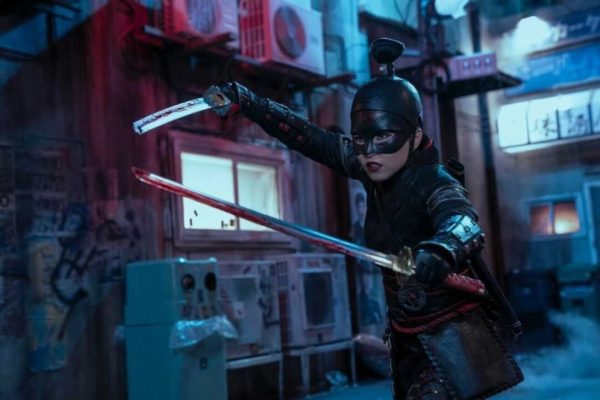
JOE
Lol. I loved the wig overview and agree with your claims about The Utopian, if only because Duhamel’s also trying to wrangle whatever is going on with that facial hair, as well. A true disasterpiece.
Reflecting back on the whole of season one, I’m convinced that Millar and his creative team believe that they have crafted great commentary with all of the drama surrounding the Code and how it does and doesn’t reflect modern times. One of the biggest issues is the missing time between the past and the present, which hypothetically would highlight how a panicked and fearful world reacts to the presence of these new Gods. Even the idea that one of their own abdicated from the Union not because they were perverted by the power, but because they disagreed with Sheldon’s two arbitrary rules seems so narratively limiting.
Because we don’t know anything about how the contemporary world full of supes differs from our reality, or what changes after Brandon “kills” Blackstar, the audience can’t buy into all of this nonsense about the Code. And ultimately, even when the twist reveals that George is in fact not the villain (or is maybe only one villain, alongside Walter), their justification – that they turned villainous because they so fundamentally disagreed with the Code – means nothing to us.
It’s just word salad, so much so that I mentally contemplated participating in a drinking game where I took a shot every time someone mentioned the Code as a way to get through the series. (I would die, Linds).
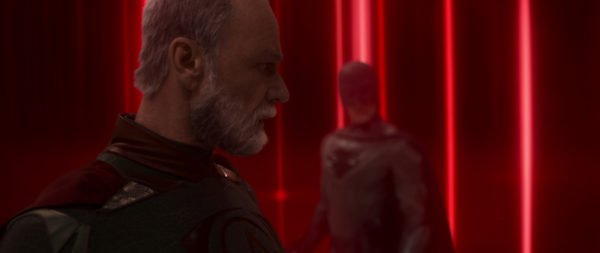
If I can offer any praise for the series, it’s that I like Ben Daniels a lot. While his mustache twirling reveal is disappointing because it doesn’t make a lot of sense (at least right now), his grief and rage (in the past) and hubris (in the present) definitely helped make the back half of the season more bearable. Plus: I’m all about supporting a queer actor in a spandex suit!
I can’t say that he’s enough to lure me back should Jupiter’s Legacy earn a second season, though. I’m tapping out.
Season Grade: C-
What about you, Linds: is there something the series could do to get you to invest in S2? Did you have a favourite character or sequence? And what’s your final grade for S1 of Jupiter’s Legacy?
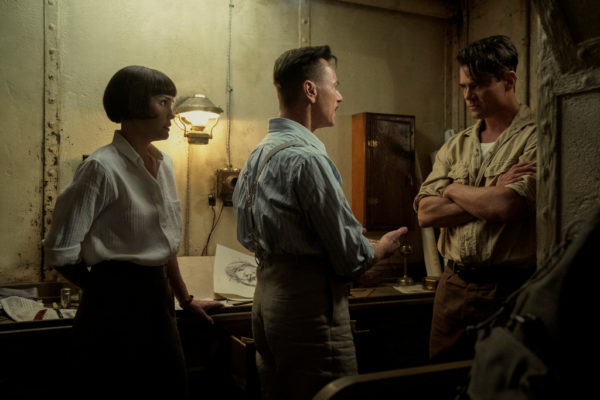
LINDSAY
Yes, Ben Daniels and Leslie Bibb are the MVPs in my opinion. Daniels gave the most nuanced and deep performance, and Bibb is just likeable. It’s unfortunate we were saturated with characters that were supposed to have depth and flaws, because if there was some focus on Walter, or George, or even Sheldon, it might have been compelling.
I didn’t really buy into Walter’s “it’s because of you” speech with Sheldon, but seeing him take on some of the grief could have pulled me in farther. Sheldon, by contrast, takes on all of the grief and centers himself in it while Walter plays the supportive sibling. If he had broken in a “this hurts me too” way, I think I would have been all in on his character. Unfortunately, Walter spends so much time on the sidelines that the big reveal that could have made something like that pay off just fell flat.
I wanted so badly to care about some or any of the relationships. If Brandon’s girlfriend (or is she just his ex that he’s maybe seeing? I guess it isn’t important enough to matter) was the one who died in the field, or something, anything, to make these characters matter, I might have cared.
I really don’t see myself strapping in for a second season unless they perform a complete overhaul. What I’ve seen thus far makes me assume the creators have no interest in exploring the themes they spit all over the page. It’s no secret that I love villains, so I could see myself wanting to dance with George and whatever compelled Walter, but I don’t trust the series not to strap them to Blackstar and that psychiatrist guy and give us a paper dolls version of Suicide Squad.
Kind of a bummer, but I don’t expect I will tune in at the same Bat time or channel.
Season Grade: C-
All 8 episodes of Jupiter’s Legacy are now available on Netflix.
After the first episode I was kind of meh. But by episode 5 I’m really glad I kept watching, it’s fantastic stuff.